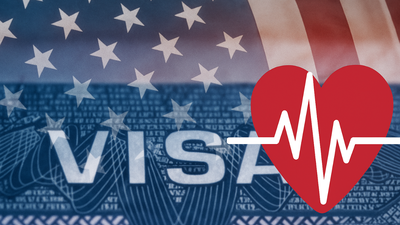A new directive from the Trump administration could make it harder for foreigners with certain health conditions to obtain visas to live in the United States. The State Department has instructed consular officers worldwide to weigh applicants’ medical histories and their ability to afford treatment when deciding visa eligibility — a move critics say could open the door to discrimination and arbitrary decisions.
What the new guidance says
The State Department has directed visa officers to “consider an applicant’s health” when assessing whether they could become a “public charge” — someone likely to rely on government assistance. The guidance lists several conditions that could be factored into decisions, including cardiovascular and respiratory diseases, cancers, diabetes, metabolic and neurological disorders, and mental health conditions. It also flags obesity, citing its links to high blood pressure, sleep apnea, and asthma.”You must consider an applicant’s health,” the advisory read. “Certain medical conditions, including, but not limited to, cardiovascular diseases, respiratory diseases, cancers, diabetes, metabolic diseases, neurological diseases, and mental health conditions, can require hundreds of thousands of dollars’ worth of care, ” as reported by CBS News. Officers have been told to examine whether an applicant or their dependents might require “expensive, long-term care,” and whether they can afford treatment without depending on public programs such as Medicaid.Also read: US to deny visas to people with diabetes, heart disease and other chronic illnesses
Who all would be affected by the new rule?
It is not yet clear whether the directive will extend to temporary visa categories such as tourist or student visas. While the language technically covers all visa applicants — including those applying for short-term stays like B-1/B-2 (tourism or business) and F-1 (student) visas — officials are expected to apply it primarily to individuals seeking permanent residency in the United States. Currently, tourist visa applicants must already prove they have adequate financial resources for their visit, intend to return home after their authorized stay, and will not become a “public charge” during their time in the country.
What’s new here
Health checks have long been part of the immigration process. Applicants for US visas and green cards must undergo medical examinations by approved physicians to screen for communicable diseases such as tuberculosis and to verify vaccination records. What’s new is the expansion of what counts as a potential health risk. The latest directive allows consular officers to consider a broader range of chronic and non-communicable conditions and to make subjective judgments about how much future care might cost. Experts say that gives officers far more discretion than before — and without medical training, those judgments could easily be inconsistent or biased. Immigration attorney Charles Wheeler of the Catholic Legal Immigration Network called the directive “troubling,” noting that officers “are not medically trained” to predict how a person’s health might progress, as reported by CBS News. The guidance, he said, instructs visa officers to form “their own thoughts about what could lead to some sort of medical emergency or sort of medical costs in the future.” He added, “That’s troubling because they’re not medically trained, they have no experience in this area, and they shouldn’t be making projections based on their own personal knowledge or bias.”Sophia Genovese, an immigration lawyer at Georgetown University, said the language effectively encourages officials to “speculate on the cost of applicants’ medical care” and could lead to unpredictable outcomes.
A return to the ‘public charge’ rule
The new guidance echoes and expands upon the controversial “public charge” rule introduced during Trump’s earlier term, which made it harder for immigrants to obtain green cards if they had used, or were likely to use, public benefits like Medicaid or housing aid. That rule was rolled back by the Biden administration in 2022, narrowing its scope to people primarily dependent on government cash assistance. The latest directive revives the concept in a broader form — explicitly linking health conditions, age, and financial self-sufficiency to an applicant’s eligibility. A State Department official told The Hill that visa decisions would still be made on a “case-by-case basis” and that simply having a medical condition would not automatically disqualify anyone. Instead, the key factor would be whether the applicant could cover their medical costs “over their expected lifespan” without government help.
Why it matters
The policy could have sweeping implications for those seeking to immigrate permanently to the United States, particularly older applicants or people with chronic illnesses. With roughly 10 per cent of the world’s population living with diabetes and nearly 40 per cent of Americans considered obese, the rule potentially touches a vast number of visa hopefuls. Immigrant rights advocates warn that the directive could disproportionately impact applicants from lower-income countries, where access to private healthcare is limited. It could also discourage individuals from disclosing medical conditions or seeking treatment out of fear it may harm their immigration prospects. Go to Source


